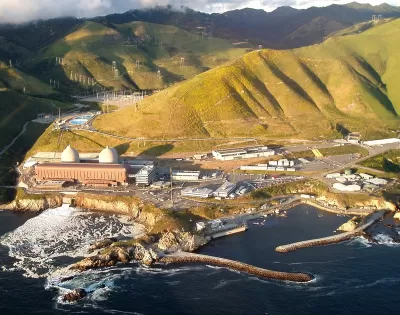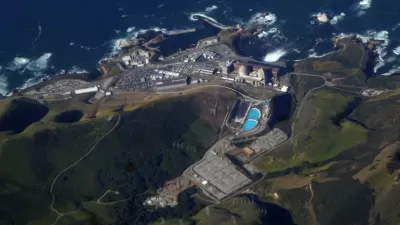The Pacific Gas and Electric Company's Diablo Canyon Nuclear Power Plant received approval from the California PUC to operate its two reactors until 2029 and 2030. Five days later, the NRC issued a temporary license renewal.

“PG&E has won approval to keep operating the aging Diablo Canyon nuclear plant in San Luis Obispo County,” reported George Avalos of the Bay Area News Group on December 14, 2023 for The Mercury News.
The five-member state Public Utilities Commission (PUC) voted 3-0 to approve an extension of the operating license for the Diablo Canyon nuclear complex, perched near Avila Beach next to the Pacific Ocean. One commissioner was absent, while another abstained.
Diablo Canyon’s Unit 1 reactor is now slated to cease operations in October 2029 while the Unit 2 reactor will end its operations in October 2030.
[See pg. 51 of 72 of PUC agenda [pdf] for Dec. 14: “Extended Operations at Diablo Canyon Nuclear Power Plant.”
Approval preordained, based on ‘energy reliability’
“The state regulatory decision to authorize the extended operations was the outcome of a September 2022 vote by the state legislature to approve SB 846 — a bill signed by Newsom,” adds Avalos in the subscription-only source article.
The legislature determined that extended operations of Diablo Canyon are necessary to ensure reliable electricity supplies until more green energy sources can come online.
[See related posts: Legislature Extends $1.4 Billion Lifeline to California's Last Operating Nuclear Power Plant, September 6, 2022, and the two earlier ones under “Related” below this post]
“Climate change is causing unprecedented stress on California's energy system and I appreciate the Legislature's action to maintain energy reliability as the State accelerates the transition to clean energy,” wrote Gov. Gavin Newsom in his signing letter [pdf] on Sept. 2, 2022.
“Energy reliability is critical to Americans’ daily lives,” notes the U.S. Department of Energy's description.
It is vital to human health, safety, and well-being and the nation’s economic prosperity and security...The effects of climate change and aging U.S. energy infrastructure are key challenges to energy reliability.
[See Planetizen's 'energy security' and 'electricity reliability' tags for related posts.]
Nuclear Regulatory Commission ruling follows
“The federal Nuclear Regulatory Commission (NRC) determined today that Pacific Gas and Electric Company's (PG&E) License Renewal Application (LRA) for extended operations of Diablo Canyon Power Plant (DCPP) is sufficient for its review,” notes PG&E's press release on Dec. 19.
The NRC's determination of sufficiency now allows PG&E to continue operating Units 1 and 2 at DCPP past their current licenses (2024 and 2025, respectively), while the LRA is under review.
Not to be forgotten: IIJA
Last but certainly not least, the federal bipartisan infrastructure legislation that made the 5-year extension possible, the Infrastructure Investment and Jobs Act. See May 31, 2022 post: Extending the Life of California's Largest Power Plant.
The passage of the Infrastructure Investment and Jobs Act (previously known as the bipartisan infrastructure framework) last November, specifically the inclusion of the $6 billion Civil Nuclear Credit Program to extend the life of nuclear power plants unable to compete with cheaper power from natural gas and renewable power facilities, influenced California Gov. Gavin Newsom's reconsideration of the decision made by PG&E six years ago to close the state's last nuclear power plant.
Accessible news report: The Santa Barbara Independent reported on Dec. 20 on both the PUC approval and NRC announcement on PG&E's Diablo Canyon Power Plant.
FULL STORY: PG&E gets OK to keep open Diablo Canyon nuclear plant: bills may jump

Planetizen Federal Action Tracker
A weekly monitor of how Trump’s orders and actions are impacting planners and planning in America.

Map: Where Senate Republicans Want to Sell Your Public Lands
For public land advocates, the Senate Republicans’ proposal to sell millions of acres of public land in the West is “the biggest fight of their careers.”

Restaurant Patios Were a Pandemic Win — Why Were They so Hard to Keep?
Social distancing requirements and changes in travel patterns prompted cities to pilot new uses for street and sidewalk space. Then it got complicated.

California Homeless Arrests, Citations Spike After Ruling
An investigation reveals that anti-homeless actions increased up to 500% after Grants Pass v. Johnson — even in cities claiming no policy change.

Albuquerque Route 66 Motels Become Affordable Housing
A $4 million city fund is incentivizing developers to breathe new life into derelict midcentury motels.

DC Area County Eliminates Bus Fares
Montgomery County joins a growing trend of making transit free.
Urban Design for Planners 1: Software Tools
This six-course series explores essential urban design concepts using open source software and equips planners with the tools they need to participate fully in the urban design process.
Planning for Universal Design
Learn the tools for implementing Universal Design in planning regulations.
Heyer Gruel & Associates PA
JM Goldson LLC
Custer County Colorado
City of Camden Redevelopment Agency
City of Astoria
Transportation Research & Education Center (TREC) at Portland State University
Camden Redevelopment Agency
City of Claremont
Municipality of Princeton (NJ)




























